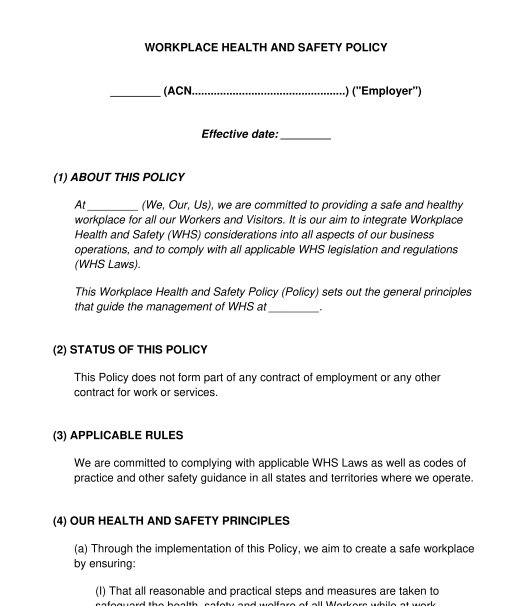 12/11/2025
12/11/2025

Answer a few questions and your document is created automatically.

Your document is ready! You will receive it in Word and PDF formats. You will be able to modify it.




Rating: 4.5 - 55 votes
Fill out the templateA Workplace Health and Safety Policy is a policy document which outlines the approach a business or organisation takes to ensuring the health and safety of employees and other persons at work. This document is designed for use by businesses and organisations which are based in Australia.
For example, it outlines the things workers must do to manage health and safety at the workplace, the employer's risk management process, how to identify hazards and assess risks, how to report incidents or raise concerns, and what to do in case of emergency.
This Policy can assist in setting out an employer's commitment to health and safety while giving instructions and information to employees, contractors, customers and other third parties who have contact with the business.
While it is not mandatory to have a written Workplace Health and Safety Policy, in Australia, employers (as well as some contractors) are legally obliged to implement work health and safety policies, practices and procedures and to provide a safe and healthy workplace to their workers.
A written Workplace Health and Safety Policy is an important step in this process and can help manage risks and demonstrate the employer's compliance with their health and safety obligations.
In addition to this Workplace Health and Safety Policy, there are various other employment policies that employers should consider, such as:
A person conducting a business or undertaking (PCBU) is a concept in Australian work health and safety laws but effectively it refers to the employer. However it covers a broad range of working arrangements including contractors. It could be a company, an unincorporated body or association, a sole trader or self-employed person, or the partners in a partnership. A PCBU has a primary duty of care to ensure, so far as reasonably practicable, the health and safety of workers.
In some cases there could be multiple PCBUs at a workplace, who will share duties under work health and safety laws. For example, a contractor and subcontractor could both be PCBUs.
Usually senior members of staff will prepare the Workplace Health and Safety Policy. This could involve senior managers or directors, or a health and safety officer.
Ultimately, the PCBU (ie. the employer/business/organisation) will be responsible for workplace health and safety, so it is in their interests to be involved in designing and implementing the Policy.
There is no expiry date for a Workplace Health and Safety Policy so it can remain in place indefinitely. However, it should be reviewed regularly to ensure that it is up to date with current laws and with the organisation's current practices.
Once a Workplace Health and Safety Policy is ready, it should be printed and/or saved electronically and kept on file with the employer, and employees should be made aware of it. For example, any existing employees should be notified of it and given a copy of it.
In addition, each time a new employee starts work with the employer, the new employee should be given a copy of the Policy.
If the employer is getting employees to sign this Policy, the employer should get each employee to return a signed signature page, and should keep those signed pages on file.
From time to time, if the employer implements new rules or procedures, it may be necessary to update the Policy. When this occurs, the employer may notify employees of the updates, and release a new version of the Policy. The employer may ask employees to sign a new signature page at that time, to acknowledge the updated Policy.
This document should include:
The Fair Work Act 2009 (Commonwealth) applies the National Employment Standards (NES), which are a set of minimum employment standards in Australia.
In addition, each state and territory has legislation that deals with various employment matters such as occupational health and safety or discrimination. Further information about this is also available from Safe Work Australia.
This document does not take into account the requirements of modern awards or enterprise agreements. If such an award or agreement applies, then that will set out some additional minimum standards with which the employer must comply.
General principles of contract law, as provided by the common law, may also apply.
You fill out a form. The document is created before your eyes as you respond to the questions.
At the end, you receive it in Word and PDF formats. You can modify it and reuse it.
Guides to help you
Workplace Health and Safety Policy - sample template
Country: Australia